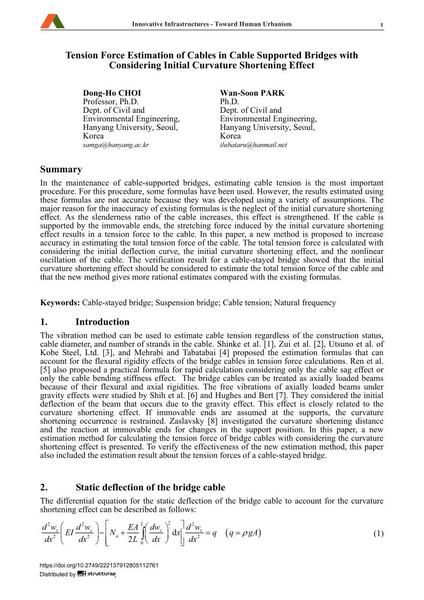Tension Force Estimation of Cables in Cable Supported Bridges with Considering Initial Curvature Shortening Effect

|
|
|||||||||||
Détails bibliographiques
| Auteur(s): |
Dong-Ho Choi
Wan-Soon Park |
||||
|---|---|---|---|---|---|
| Médium: | papier de conférence | ||||
| Langue(s): | anglais | ||||
| Conférence: | 18th IABSE Congress: Innovative Infrastructures – Towards Human Urbanism, Seoul, Korea, 19-21 September 2012 | ||||
| Publié dans: | IABSE Congress Seoul 2012 | ||||
|
|||||
| Page(s): | 2136-2141 | ||||
| Nombre total de pages (du PDF): | 6 | ||||
| DOI: | 10.2749/222137912805112761 | ||||
| Abstrait: |
In the maintenance of cable-supported bridges, estimating cable tension is the most important procedure. For this procedure, some formulas have been used. However, the results estimated using these formulas are not accurate because they was developed using a variety of assumptions. The major reason for the inaccuracy of existing formulas is the neglect of the initial curvature shortening effect. As the slenderness ratio of the cable increases, this effect is strengthened. If the cable is supported by the immovable ends, the stretching force induced by the initial curvature shortening effect results in a tension force to the cable. In this paper, a new method is proposed to increase accuracy in estimating the total tension force of the cable. The total tension force is calculated with considering the initial deflection curve, the initial curvature shortening effect, and the nonlinear oscillation of the cable. The verification result for a cable-stayed bridge showed that the initial curvature shortening effect should be considered to estimate the total tension force of the cable and that the new method gives more rational estimates compared with the existing formulas. |
||||
| Mots-clé: |
Pont à haubans pont suspendu
|
||||
